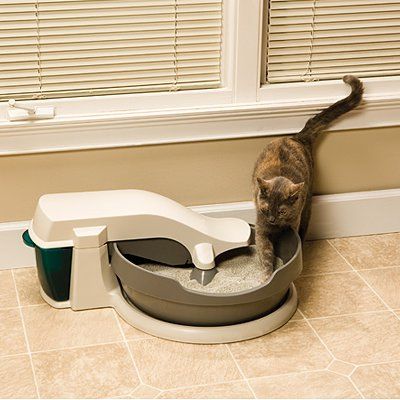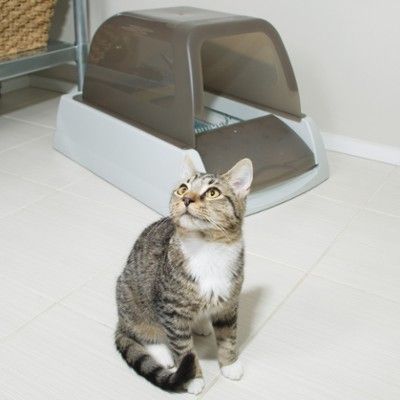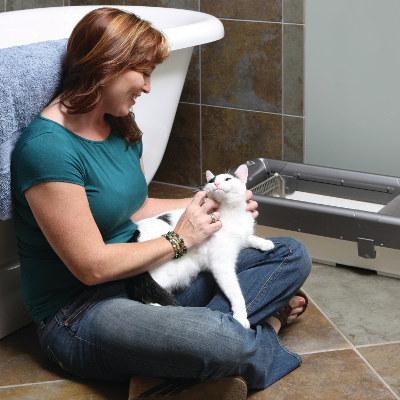An automatic litter box offers many benefits to you, as well as your cat, including convenience and an always clean potty. When your cat already swears allegiance to a traditional litter box, though, it may take some time to convince your cat to try out the new facility.
 It's easiest to train kittens to an automatic litter box. Almost all kittens will already know what a litter box is for, and how to use it, by the time you adopt them. For babies, it's often enough to simply set up the box, place the baby on the litter, and scratch the litter with your fingers. It's a good idea to leave one fresh deposit in the new litter box to offer a scent signal about what's expected. When he is productive, praise him extravagantly, and offer a favorite game or treat as reward. Allow the baby to climb out of the litter box by himself and make his way from the area. That will help him remember how to find his way back to the box when nature calls again.
It's easiest to train kittens to an automatic litter box. Almost all kittens will already know what a litter box is for, and how to use it, by the time you adopt them. For babies, it's often enough to simply set up the box, place the baby on the litter, and scratch the litter with your fingers. It's a good idea to leave one fresh deposit in the new litter box to offer a scent signal about what's expected. When he is productive, praise him extravagantly, and offer a favorite game or treat as reward. Allow the baby to climb out of the litter box by himself and make his way from the area. That will help him remember how to find his way back to the box when nature calls again.
Adult cats, though, have strong opinions about toilet facilities, including the placement and style of the litter box. Strays rescued from the neighborhood or shelter that spent previous years outdoors may not have a clue about using an indoor litter box.
Keep in mind your cat's likes and dislikes so that you make his new automatic litter box the best option he has, and he won't seek out alternatives. Cats don't want to have a bathroom near where they sleep or eat, and often like privacy.
8 Steps for Automatic Litter Box Training
-
 Set up your automatic litter box according to product directions. Position it next to the traditional litter box your cat already likes to use, in a low-traffic area of the house.
Set up your automatic litter box according to product directions. Position it next to the traditional litter box your cat already likes to use, in a low-traffic area of the house. - Fill the automatic box with the same kind of litter your cat uses in his traditional box, but don't turn on the box just yet. Give your cat several days to check out this new facility. If the product comes with a cover, remove that until your cat has fully transitioned so he never feels caught or trapped inside.
- If you have a kitten, or are transitioning an outdoor cat without an existing litter box preference, place just a bit of soiled litter in the clean automatic litter box pan. The aroma helps these newbies to get the idea of what's expected.
- Now is not the time to change substrates! If a different type of litter is required for the automatic box, first transition to the new litter (in the old box the cat already accepts) before introducing the automatic box. Sprinkle a bit of the "new" substrate on top of the familiar accepted litter for several days to be sure your cat won't be put off by the new litter, and gradually increase the new. Only then offer the new litter box with new litter side by side with the old facility for the cat to explore.
- Give cats the option to choose which box to use for at least a week. As an added incentive, sprinkle a bit of catnip in the litter tray of the automatic box.
-
 Wait until the cat has begun using the new automatic box before you attempt to turn it on. Motor noise or unexpected motion may startle sensitive cats, or the opposite--intrigue them. My cat decided the rake was kitty entertainment, and ran to watch and paw-whap it into submission each time it switched on. Praise when you catch the cat being productive in the new box, and offer a treat.
Wait until the cat has begun using the new automatic box before you attempt to turn it on. Motor noise or unexpected motion may startle sensitive cats, or the opposite--intrigue them. My cat decided the rake was kitty entertainment, and ran to watch and paw-whap it into submission each time it switched on. Praise when you catch the cat being productive in the new box, and offer a treat. - Once you've switched on the automatic box, supervise to be sure you see your cat still uses the new facility. If your cat is still using the old box, leave the waste there for one day without scooping, while the automatic box cleans itself, which should be an incentive to choose the new facility. Be aware, however, that cats often prefer to use one box for liquids and another for solids, so it may take time to convince your cat to do both in one container.
- To retrain your cat to use the automatic litter box, it's only fair to give her every opportunity to do good. Time her bathroom visits--after vigorous play, a snack, or a nap offer ideal opportunities. Healthy adult cats typically visit the litter box five times a day.
Once you've found a location, box filler, and automatic litter box that your cat accepts, for heaven's sake, stick to it! Changing the brand of litter, or switching box location or routine may prompt house soiling problems.








